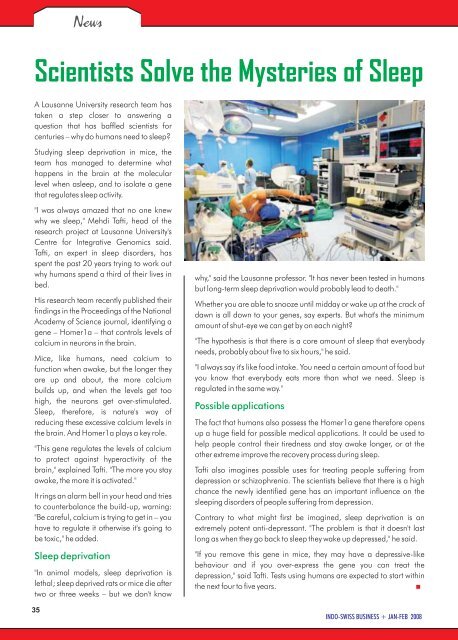NewsScientists Solve the Mysteries of SleepA Lausanne University research team hastaken a step closer to answering aquestion that has baffled scientists forcenturies – why do humans need to sleep?Studying sleep deprivation in mice, theteam has managed to determine whathappens in the brain at the molecularlevel when asleep, and to isolate a genethat regulates sleep activity."I was always amazed that no one k<strong>new</strong>why we sleep," Mehdi Tafti, head of theresearch project at Lausanne University'sCentre for Integrative Genomics said.Tafti, an expert in sleep disorders, hasspent the past 20 years trying to work outwhy humans spend a third of their lives inbed.His research team recently published theirfindings in the Proceedings of the NationalAcademy of Science journal, identifying agene – Homer1a – that controls levels ofcalcium in neurons in the brain.Mice, like humans, need calcium tofunction when awake, but the longer theyare up and about, the more calciumbuilds up, and when the levels get toohigh, the neurons get over-stimulated.Sleep, therefore, is nature's way ofreducing these excessive calcium levels inthe brain. And Homer1a plays a key role."This gene regulates the levels of calciumto protect against hyperactivity of thebrain," explained Tafti. "The more you stayawake, the more it is activated."It rings an alarm bell in your head and triesto counterbalance the build-up, warning:"Be careful, calcium is trying to get in – youhave to regulate it otherwise it's going tobe toxic," he added.Sleep deprivation"In animal models, sleep deprivation islethal; sleep deprived rats or mice die aftertwo or three weeks – but we don't know35why," said the Lausanne professor. "It has never been tested in humansbut long-term sleep deprivation would probably lead to death."Whether you are able to snooze until midday or wake up at the crack ofdawn is all down to your genes, say experts. But what's the minimumamount of shut-eye we can get by on each night?"The hypothesis is that there is a core amount of sleep that everybodyneeds, probably about five to six hours," he said."I always say it's like food intake. You need a certain amount of food butyou know that everybody eats more than what we need. Sleep isregulated in the same way."Possible applicationsThe fact that humans also possess the Homer1a gene therefore opensup a huge field for possible medical applications. It could be used tohelp people control their tiredness and stay awake longer, or at theother extreme improve the recovery process during sleep.Tafti also imagines possible uses for treating people suffering fromdepression or schizophrenia. The scientists believe that there is a highchance the <strong>new</strong>ly identified gene has an important influence on thesleeping disorders of people suffering from depression.Contrary to what might first be imagined, sleep deprivation is anextremely potent anti-depressant. "The problem is that it doesn't lastlong as when they go back to sleep they wake up depressed," he said."If you remove this gene in mice, they may have a depressive-likebehaviour and if you over-express the gene you can treat thedepression," said Tafti. Tests using humans are expected to start withinthe next four to five years.<strong>INDO</strong>-<strong>SWISS</strong> BUSINESS + JAN-FEB 2008
NewsSwiss exports grew by more than 10 percent in 2007 forthe second year in a row, although the final quarter sawdemand fall off. The strength of the watchmaking industrycontributed towards the good performance, figures fromthe Federal Customs Office show.The global economic outlook could mean that figures arenot as good this year, even if the Swiss economy is unlikelyto suffer.According to the statistics, the food, beverage andtobacco industry did best last year, increasing itsexports by nearly 24 per cent. Coffee sales abroadtrebled to SFr570 million, while beverage exportsincreased by a third.The watchmaking industry (+16.1 per cent) came insecond in the export rankings. It was a record year forwatchmakers, who shipped nearly SFr16 billion worth ofgoods abroad last year."Our success is mainly due to the good health of theglobal economy and demand from emerging markets,"said Jean-Daniel Pasche, president of the Federation ofthe Swiss Watch Industry. Pasche said that watchmakerswere in a position to respond to customer demand forinnovative products.Luxury watchesThe luxury watch segment represented two-thirds of salesabroad, with clients especially interested in mechanicaltimepieces. But there was increased demand for all kindsof watches.Swiss Exports Up 10 pcDespite Global Economic Slowdownthan the previous year.Exports to industrialised nations, especially to those in theEuropean Union, Switzerland's biggest trading partner,grew by a tenth, while those to emerging marketsincreased by a quarter. There was almost no growth inUnited States exports.Slowing demandWhile the year was generally good for Swiss productsabroad, the final quarter of 2007 saw a decline ingrowth, especially in December."The decline in export growth reflects slowing demandfrom the global economy," said Felix Brill, an economist atSwiss bank UBS. "However export and import data is quitevolatile in Switzerland, since a single event, such as anaircraft purchase by a local airline can easily distort thefigures."Brill said that this trend is likely to continue in 2008. "Thestrength of the Swiss franc versus the euro and the dollarwill also dampen export growth," he added. TheSwiss economy should not suffer from a turndowneither according to Brill, who says that imports willremain strong."This should continue as a result of stronger consumption,especially for label brands, due to employment growthand real wage increases," he pointed out.No recession fearsWatchmakers for example are not particularly concernedThe metal industry, third in the export rankings, saw prices by fears of a recession or of a knock-on effect for thefor iron and steel take off, increasing by nearly a quarter in turbulent financial markets.2007, but overall growth was only slightly above last "Our progression will continue," said Pasche. "We don'tyear's result at 15.3 percent.think our sales will be affected by the current state of theThe plastics sector's exports stood at 12.5 per cent, while stock market."the machine and electronics industry's growth was 1.5 Brill tends to agree. "If anything, firms have found it easierpoints better than in 2006 at 11.3 per cent. Equipment for to access cheaper loans over the past few months," hethe graphics sector (-6 per cent) and telecommunications said. "They also still have full order books and don't seemitems (-19.8 per cent) failed to attract foreign buyers. about to give up on plans to invest."The chemical industry, which includes the all-important But he warns that "if the US does go into recession, andpharmaceutical sector, saw sales abroad increase by 9.3 consumer and business sentiment deteriorate,percent in 2007. However, this was more than a third less companies could delay investments". 36<strong>INDO</strong>-<strong>SWISS</strong> BUSINESS + JAN-FEB 2008
















